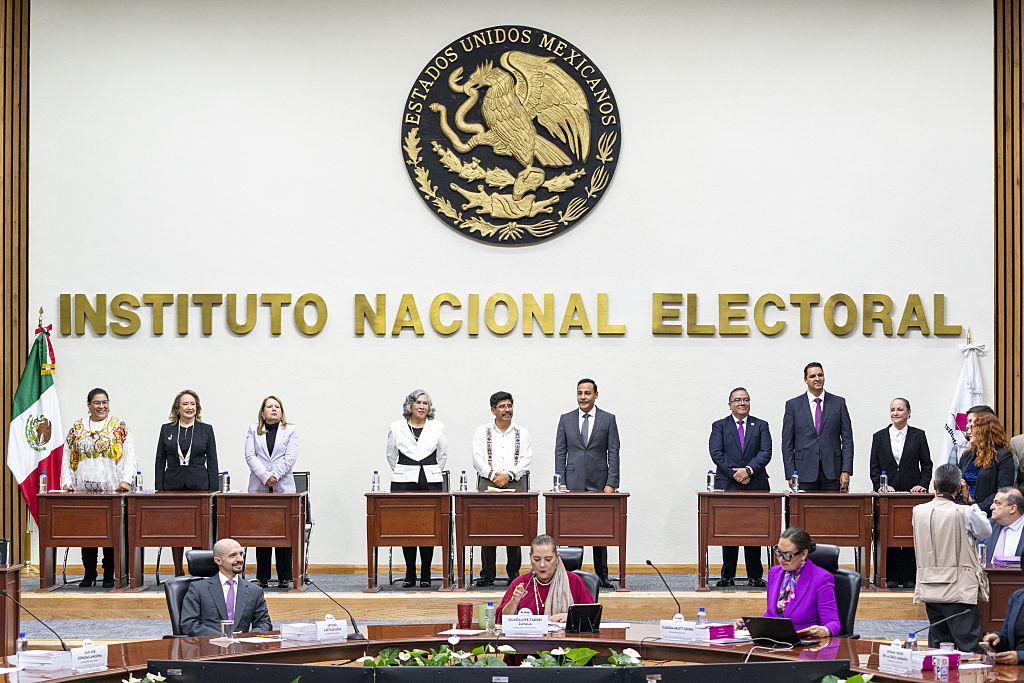Summary - IACHR: The Impact of Potential Reforms on Human Rights and Freedom of Expression
Summary - IACHR: The Impact of Potential Reforms on Human Rights and Freedom of Expression
A February 25 panel explored potential reforms to the Inter-American Commission on Human Rights and the implications of these changes for the inter-American system.
Speakers:
- Joel Hernández García, Ambassador, OAS Permanent Representative of Mexico
- Walter Albán Peralta, Ambassador, OAS Permanent Representative of Peru
- Darío Paya, Ambassador, OAS Permanent Representative of Chile
- Breno Dias da Costa, Interim Representative of Brazil
- Christopher Sabatini, Editor-in-Chief, Americas Quarterly and Senior Director of Policy Americas Society and Council of the Americas (moderator)
Summary
Fifty-three years after its creation, the future of the region’s independent observer and protector of human rights may be at risk. On March 22, 2013, the General Assembly (GA) of the Organization of American States (OAS) will hold a special session in which it will consider a series of proposals for reforming the Inter-American Commission on Human Rights (IACHR). AS/COA convened a select group of ambassadors to the OAS, journalists, human rights activists, and experts from throughout the Americas to discuss the reforms’ implications for the inter-American system.
[[nid:49149]]
The IACHR Reforms
Since mid-2011, a group of member states led by the Bolivarian Alliance for the Americas bloc—notably Ecuador and Venezuela—have called for reforms of the IACHR and the Special Rapporteur for Freedom of Expression. Proposals include restricting the body’s discretion in granting precautionary measures, changing the headquarters of the OAS, reducing the activities of and funding for the Special Rapporteur for Freedom of Expression, enforcing the adoption of a new code of conduct for Rapporteurships, and imposing restrictions on the Commission’s decisions regarding individual complaints.
During the OAS summit in Cochabamba in June 2012, the General Assembly adopted a resolution that paved the way for the discussion of the reforms. At that time, the GA decided that proposals for reforms would be submitted for consideration during a special session of the GA within six to nine months. These initiatives would not have gone so far if other states in the region had not adopted a passive and complicit acceptance of these proposals, said AS/COA’s Christopher Sabatini.
Some of these countries have their own reasons to remain silent on the reforms. Brazil, for example, suspended relations with the IACHR when the regional body issued precautionary measures asking to immediately halt the construction of the Belo Monte dam. The IACHR concluded that the Brazilian government hadn’t properly consulted indigenous communities in the area.
Watch a CNN video about the IACHR reforms with AS/COA's Christopher Sabatini.
Implications for the Inter-American System
Ambassadors from Brazil, Chile, Mexico, and Peru recognized the relevance of the IACHR, but expressed the need to improve the Commission as part of a larger overhaul process of the inter-American system. The Mexican and Chilean representatives highlighted the autonomy of the IACHR and its need for greater financial contributions from its members. Breno Dias da Costa of Brazil acknowledged there was initial resistance to the reforms, but expressed optimism in the outcome of the process. Walter Albán Peralta, the Peruvian representative, expressed the need to revise certain practices and to promote a more efficient use of precautionary measures.
One of the key topics of discussion was whether the GA would allow for a suspension of article 39, which requires the OAS to decide matters on the basis of unanimity. Suspension of this clause would allow GA members to decide on the reforms by majority—rather than by consensus—breaking with the tradition of the OAS. The ambassadors from Chile and Mexico explained they believe the clause would not be suspended. Dias da Costa, however, stated that a suspension should not be seen as negative, since a majority vote is a common feature of democracies.
Human rights activists and members of the press presented a less optimistic vision of the reforms. Viviana Krsticevic, executive director of the Center for Justice and International Law, said that restricting precautionary measures—which are used by the Commission to defend civil society activists—will compromise the OAS’ capacity to efficiently respond to human rights violations. Claudio Paolillo, director of Uruguayan magazine Búsqueda, noted that once these reforms are in place, the Rapporteurship for Freedom of Expression will also become irrelevant. As a result, citizens’ right to receive information would be at risk.
Next Steps for the Reforms
The IACHR has made efforts to study the recommendations made by the states and has considered making adjustments to its regulations. On March 8, the signatories of the Inter-American Convention on Human Rights will convene in Guayaquil, Ecuador to evaluate the Commission’s progress in adopting these recommendations. José Miguel Vivanco, director of Human Rights Watch’s Americas division, voiced his concerns over the meeting’s impact on the vote. But according to the Mexican and Brazilian ambassadors, the event will be informal and will not lead to any resolution.
On March 22, all participating members of the OAS will vote on the proposed reforms. It would only require 18 out of 34 votes to suspend article 39. To date, Venezuela, Ecuador, and their allies control 15 votes in the OAS, and only need three more to push the measures through.
Members of the media and human rights specialists agreed that member states should exercise a more active role in the discussion. They noted that time is running out to raise awareness about the implications these reforms could have for human rights in Latin America.








